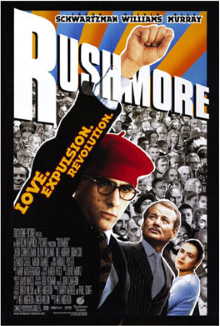We’ve watched almost every Wes Anderson film by now, but not this one. This was his second film and the one that received enough critical attention to establish his career. It was also his first collaboration with Bill Murray and of course we know how that went. Anderson was only 29 years old when he made this so it is remarkable that the essentials of his signature style are all already present here. His newer films can boast of bigger budgets and more polish, but I find that I really enjoyed the restraint and lower stakes in this one.
Max Fisher’s family isn’t rich but the 15-year old boy attends the prestigious private Rushmore Academy on a scholarship. Yet his grades are atrocious as he doesn’t care about studying at all and instead puts all of his energy and considerable talent into extra-curricular activities. He is the founder of several clubs at school and participates in many more. At a school assembly he takes a liking to Herman Blume, a rich businessman who is one of the school’s benefactors. Herman feels disconnected with his own brutish sons who attend the school and sees in Max perhaps a kind of kindred spirit so they become friends. Max also falls in love with a teacher at the school, Rosemary Cross. She is impressed by his intelligence and earnestness but gently rebuffs him when she realizes he is trying to woo her. Herman tries to discourage his interest as well but actually falls in love with her himself and Max’s antics, together with his poor grades, soon get him expelled from the school.
As with Anderson’s other work, this feels like a cartoon for adults shot in live-action, a deliberate effect that Anderson and his co-writer Owen Wilson here calls heightened reality. I actually like this a lot more than some of his more recent films as the cartoon sensibility is a better fit for this school-based setting than something that involves real violence and loss of life. I feel a lot better about laughing at the gags and antics here with the lower stakes. The visuals are of course amazing and the entire film crackles with energy so it is a real joy to watch from the beginning to the end. Anderson apparently considers Max to be loosely based on himself, including Max’s habit of writing and staging fabulously over-produced school plays. Based on this, you can imagine the kind of insane creative energy Anderson had as a teenager.
I do note that while this is a supremely entertaining film, Max’s behavior makes him a highly unpleasant person if this were real life. Anderson was aware of this and worked hard to cast someone like then newcomer Jason Schwartzman for the role, focusing on his ability to retain the sympathy of the audience even as he does deplorable actions. It’s actually very remarkable how patient and accommodating everyone around him is, including the beleaguered headmaster of Rushmore. They effectively let him off because everyone acknowledges that he is a creative genius and he is motivated by an overabundance of enthusiasm rather than malice.
Anyway I’ve always enjoyed Anderson’s films and I enjoyed this one more than most. But I’ve also never considered myself to be a big fan and none of his work really resonated with me on a personal level. Watching this one, and especially realizing that it is at least semi-autobiographical, helped me realize that Anderson is really all about the celebration of the idiosyncratic. The worst thing in the world for him is to be a mundane, square person with no intellectual curiosity, no creativity and no sense of fun. As such the vibrant colors of his visual style highlights the wonderful weirdness of adorably dorky and special people and his films are escapist fantasies away from the dreary and everyday. This is probably why even though I enjoy watching them, they tend not to leave a meaningful, lasting impression on me.
